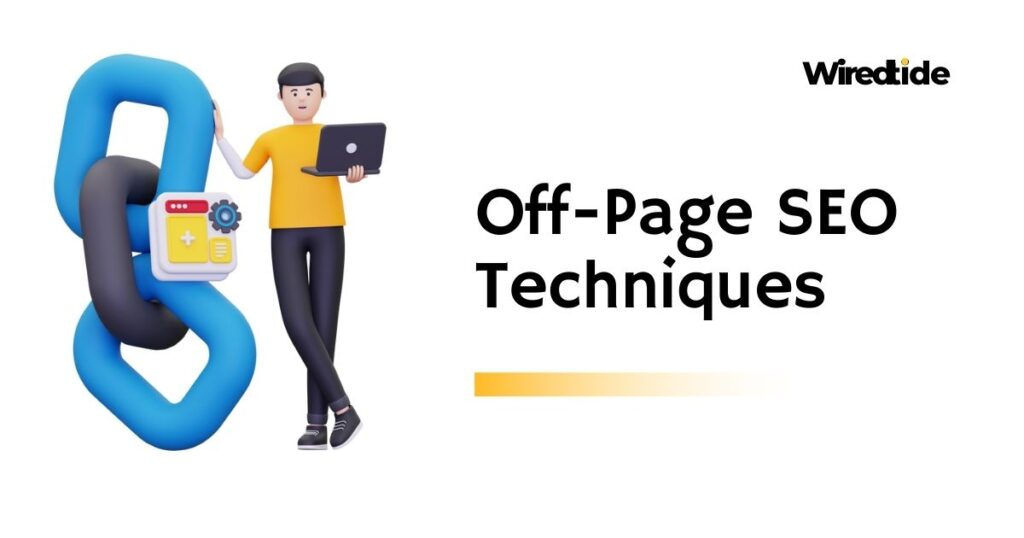What is Off-Page SEO?
Off-page SEO refers to all the activities that you and others do away from your website to raise the ranking of a page with search engines. While on-page SEO focuses on optimizing your website’s content and structure, off-page SEO involves techniques that help improve your website’s authority, reputation, and popularity across the web.
Off-page SEO refers to the strategies and techniques used to improve your website’s ranking on search engine results pages (SERPs) by focusing on external factors rather than changes to your website itself. In essence, it’s about building a strong online reputation for your website.
Why Off-Page SEO Important?
Off-Page SEO is important because it helps search engines determine your website’s authority and trustworthiness. Building high-quality backlinks, promoting your brand on social media, and engaging with other websites, you can boost your website’s ranking in search results, attract more visitors, and ultimately increase your online visibility and credibility.
On Page vs. Off Page SEO
On page SEO technique focuses on optimizing elements within a website itself to improve search engine rankings, such as content quality, keyword usage, meta tags, and website structure.
Off page SEO involves building external authority and credibility for a website by acquiring backlinks from other reputable sites, social media engagement, and online brand mentions.
On Page SEO
- Keyword optimization
- Content creation and quality
- Meta tags (title, description, headers)
- Website structure and navigation
- Image optimization
Off Page SEO
- Backlink building
- Social media marketing
- Online directories and listings
- Press releases and media coverage
- Influencer marketing
Off-Page SEO Techniques
Off-Page SEO Techniques are crucial for boosting your website’s visibility and authority beyond the confines of your own site. By leveraging external factors and building relationships, you can enhance your search engine rankings and drive more organic traffic.
Here are the best off-page SEO techniques to implement as part of your seo process.
1. Build High-Quality Backlinks
Backlinks remain one of the most critical factors in determining a website’s authority and search engine ranking. Quality matters more than quantity, so focus on obtaining links from reputable and relevant websites.
Guest Blogging: An Most Reliable Off-Page SEO Technique
Guest blogging involves writing high-quality articles for reputable blogs within your niche. This practice offers a dual benefit: it helps you establish authority and reach a broader audience, while also earning valuable backlinks to your own site.
How you are contributing insightful and relevant content to established platforms, you not only enhance your visibility but also improve your site’s search engine ranking through these backlinks. Choosing the right blogs and crafting well-researched, engaging posts can significantly impact your online presence and drive more targeted traffic to your site.
Broken Link Building: A Win-Win Strategy for SEO
Broken link building is a white-hat SEO technique that involves finding broken links on other websites and offering your own content as a replacement. It’s a mutually beneficial approach where you help website owners improve their user experience while acquiring valuable backlinks for your site.
Providing a useful and relevant alternative, you enhance the user experience on the target site while simultaneously improving your own site’s visibility and authority.
Skyscraper Technique: Building Better Content for Better Results
The Skyscraper Technique is a powerful SEO strategy that involves creating exceptional content to outperform existing high-ranking pieces and attract their backlinks. It’s like building a taller skyscraper to overshadow the competition.
In a simple way, Once your superior content is ready, reach out to the sites that linked to the original piece and offer your upgraded version as a valuable alternative. This approach not only increases your chances of earning backlinks but also positions your content as the go-to resource in your field, enhancing your site’s authority and visibility.
2. Leverage Social Media Engagement
Social media platforms are powerful tools for off-page SEO. While social signals themselves aren’t direct ranking factors, they help with brand visibility, content distribution, and engagement, which can lead to backlinks and increased traffic.
Share Content Regularly
Sharing content regularly across social media channels is a key strategy for boosting visibility and driving engagement. By actively promoting your content on platforms like Facebook, Twitter, LinkedIn, and Instagram, you increase its exposure and invite a wider audience to interact with it.
This consistent sharing encourages likes, comments, and shares, amplifying your reach and fostering a larger, more engaged community.
As your content circulates and gains traction, it can also attract backlinks and enhance your site’s overall search engine ranking, further solidifying your online presence.
Engage with Your Audience
Engaging with your audience is essential for building meaningful relationships and fostering a loyal community. Actively responding to comments, participating in discussions, and addressing feedback not only shows that you value your followers but also encourages ongoing interaction.
This engagement can lead to deeper connections, increased trust, and greater brand loyalty. By being present and responsive, you create a positive and interactive experience for your audience, which can drive more traffic to your site, enhance user satisfaction, and ultimately contribute to your long-term success.
Collaborate with Influencers
Partnering with influencers in your industry is a powerful way to amplify your content’s reach and enhance its credibility. Influencers have established trust and a dedicated following within your niche, making their endorsement a valuable asset.
Collaborating with these key influencers whether through guest posts, social media shoutouts, or joint campaigns, you tap into their audience and leverage their authority to boost your own content.
This strategic partnership not only increases your visibility but also adds a layer of credibility to your brand, fostering greater engagement and potentially driving more traffic to your site.
3. Optimize for Local SEO
For businesses targeting a local audience, off-page SEO efforts should focus on optimizing for local search. check here key local SEO strategies
- Google My Business: Ensure your Google My Business profile is fully optimized and includes accurate information, such as your business hours, address, and phone number.
- Local Citations: List your business in local directories and ensure your NAP (Name, Address, Phone Number) information is consistent across all platforms.
- Encourage Online Reviews: Positive reviews on Google, Yelp, and other review platforms can enhance your local search visibility and build trust with potential customers.
4. Engage in Influencer Marketing
Collaborating with influencers can boost your brand’s visibility, drive traffic to your site, and result in valuable backlinks.
- Identify Relevant Influencers: Look for influencers whose audience matches your target market and who have a good reputation in your industry.
- Create Collaborative Content: Work with influencers to create content that promotes your brand naturally, such as product reviews, tutorials, or co-branded campaigns.
- Offer Value: Provide influencers with something valuable, such as exclusive content, products to review, or monetary compensation for their efforts.
5. Participate in Online Communities
Active participation in online forums, communities, and Q&A sites like Reddit, Quora, and niche-specific forums can help build your brand’s authority and drive traffic.
- Answer Questions: Provide helpful, detailed answers to questions related to your industry. Include a link to your website where relevant.
- Share Expertise: Regularly contribute to discussions and share your expertise. This builds your reputation and may lead to direct traffic or backlinks.
- Network with Peers: Engage with other professionals in your field to build relationships that could lead to collaboration opportunities.
6. Content Marketing and Outreach
Content marketing isn’t just about creating content for your website; it’s also about promoting it on other platforms to build backlinks and increase visibility.
- Publish on External Platforms: Contribute articles to industry publications, high-authority blogs, and relevant news outlets to reach a broader audience and earn backlinks.
- Outreach Campaigns: Reach out to bloggers, journalists, and webmasters to promote your content. Personalize your outreach to increase your chances of success.
- Infographics and Visual Content: Create shareable visual content like infographics, which tend to attract more backlinks than text-based content.
7. Engage in PR (Public Relations)
Effective PR can increase your brand’s visibility and authority, leading to more mentions and backlinks from high-authority sites.
- Press Releases: Write press releases for major announcements and distribute them to relevant media outlets and industry publications.
- Build Relationships with Journalists: Network with journalists and offer them expert insights or exclusive stories related to your industry.
- Respond to Journalist Requests: Use platforms like HARO (Help a Reporter Out) to connect with journalists looking for expert commentary.
8. Influential Podcasting and Webinars
Podcasts and webinars are growing in popularity and offer unique opportunities for off-page SEO.
- Guest Appearances: Appear as a guest on industry-related podcasts or webinars to share your expertise and get backlinks to your site.
- Host Your Own: Create your own podcast or webinar series to build authority, attract a loyal audience, and encourage sharing and backlinking from listeners.
9. Monitor Your Brand Mentions
Tracking and managing your brand’s online reputation is crucial for off-page SEO.
- Claim Unlinked Mentions: If your brand is mentioned online without a link, reach out to the site owner and ask if they could link back to your website.
- Monitor Social Media: Keep track of your brand mentions on social media and engage with users to build a positive reputation.
- Reputation Management: Address any negative reviews or mentions by responding professionally and resolving issues where possible.
10. Engage in Link Reclamation
Link reclamation involves finding and fixing broken links pointing to your site, or reclaiming lost backlinks.
- Find Broken Links: Use tools like Ahrefs or SEMrush to identify broken links to your site, and reach out to the webmasters to update the links.
- Reclaim Lost Links: If a site that previously linked to you removes the link, contact the site owner to ask if they would consider reinstating it.
End Notes
Off-page SEO is about building your website’s reputation, authority, and credibility across the web. By focusing on high-quality backlinks, leveraging social media, optimizing for local search, and engaging in strategic content marketing and PR, you can significantly boost your site’s visibility and search engine rankings. Consistency and authenticity are key to successful off-page SEO efforts, so aim to build long-lasting relationships and provide real value in all your external activities.




